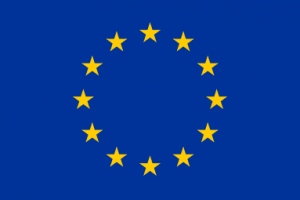Fedora’s ideas continue inspiring researchers and its results have been a fruitful foundation for further research. One of the best examples of that is the original board-game called FyouTURES, whose materials have been recently made available on Zenodo.
The game has been implemented for the first time as part of an extracurricular course for upper secondary school students called "Towards New Future Scenarios: The Role of Physics in Dealing with the Challenges of Climate Change". The course was held at the Department of Physics and Astronomy of the University of Bologna between October and November 2023, within the Piano Lauree Scientifiche program (https://www.pls.unibo.it/).
The theoretical approach behind the course was developed as part of the PhD theses of Lorenzo Miani, Francesco De Zuani Cassina and Emma D’Orto. Its aim is to show how the epistemological aspects of physics can be useful in developing the sustainability skills needed to face the challenges of climate change. In particular, the course revolves around the themes of uncertainty, complexity, decision-making, and the ability to reason about possible and desirable futures.
FyouTURES is a collaborative game where participants simulate a governmental council tasked with achieving climate goals by the year 2100. The players, working in teams, must make decisions on a wide range of factors, such as energy sources, deforestation, and taxation, all while considering various uncertainties introduced by wildcard scenarios. The game unfolds over three rounds—2030, 2050, and 2100—each corresponding to critical decision points in a future scenario. The core mechanics is based on using the simulation platform EN-ROADS: a global climate simulator that allows users to explore the impact that different policies have on several factors like energy prices, temperature, air quality, and sea level rise. Players must balance budget limitations and make strategic decisions to mitigate the impacts of climate change while pursuing sustainability goals. This setting allows participants to explore the complexities of systemic change and long-term planning in the face of uncertainties.
FyouTURES Game board
Since its inception, FyouTURES has proven to be a powerful tool for stimulating critical thinking about climate change and sustainability. The game encourages players to reflect on the relationships between environmental, economic, and societal factors, promoting systemic and critical reasoning. By engaging with different kinds of uncertainties—epistemic, aleatoric, and reflexive—players are better equipped to grasp the challenges posed by the climate crisis and develop informed perspectives on possible solutions.
The game has been played by students but also educators, who praised its potential as a teaching tool. Its ability to make abstract scientific concepts concrete, while simultaneously encouraging collaborative problem-solving, has been particularly well received. The game has also garnered attention in academic settings, where it has been presented at several research conferences. Currently, two new implementations have been already planned and discussions are underway to explore collaborations with other institutions, with the goal of expanding and refining the game for broader use.
All the game materials, including instructions, game boards, and wildcards, have been made available on Zenodo under Creative Commons license. You can explore and download them here.
We are proud to announce that FEDORA has been recognized by CORDIS (the European Commission's primary platform for EU-funded research results) as one of the standout projects that has successfully tackled the challenge of innovation in education.
A dedicated article, providing a concise overview of the project’s results, has been made available in six languages and included the "Rethinking Education through Open Schooling" Results Pack, a thematic collection tailored to specialized audiences who can further leverage these findings for broader impact.
As highlighted in the article, FEDORA has been praised for promoting a new educational paradigm specifically designed to equip today’s students with the skills, competencies, and knowledge they need to navigate the rapid and complex transformations occurring in our society and to anticipate and prepare for its future developments. This new approach aims to ensure that education systems remain responsive and adaptable in an ever-changing world, providing young people with the tools they need to thrive in both their personal and professional lives.
This recognition witnesses the spirit and dedication driving our ongoing efforts to exploit FEDORA outcomes to advance science education research. Stay tuned for updates, as we will soon share exciting developments and new progress.
From 7 to 13 September, the third edition of the summer school ONSCI (Officina di Narrazione della SCIenza) on science's storytelling and narratives was held at the Department of Physics and Astronomy of the University of Bologna in collaboration with the European project FEDORA.
On the occasion, the local FEDORA network organized “Workshop 2”, with the objective of expanding and strengthening FEDORA’s open schooling network, by involving, above all, teachers and educators, but also doctoral and master students.
In the workshop, three interdisciplinary activities guided the participants into reflecting on the role of knowledge as a source of competences to orient us in the complexity of the contemporary world and on how it is transmitted in a moment of profound transformation. After an initial shared reflection on FEDORA themes (interdisciplinarity, new languages, and future), participants were involved in educational activities focused on the intertwining between the languages of science and arts. Specifically, the participants could choose between three kinds of activities that were based on materials and approaches elaborated by teachers of the high school "Liceo Einstein" in Rimini (Sara Moresco, Paola Fantini, Maurizio Giuseppucci). In particular, the activities proposed were KAIROS and AI Atelier, previously tested by the teachers in the school context, and Mocku for change originally designed by Emma D'Orto for her master thesis work and implemented as part of an extracurricular course. All three involved high school students in their final years.
Kairos is a module designed by Sara Moresco and Paola Fantini of the Liceo “A. Einstein”, in collaboration with the group of Physics Education, represented by Francesco De Zuani Cassina, Veronica Ilari, and Olivia Levrini. The module was developed to reflect on the concept of time and its different nuances. The activity was designed to explore the many visions of time from the perspective of physics (circular time, Newtonian absolute time, linear time) and the perspective of Greek literature (aiòn, kairòs, eniautòs, chrònos). In particular, the kinds of time emerging from physics were addressed with the Greek literature perspectives of time, within a creative writing workshop. The participants were asked to start from the inspiration of physics times and then to write monologues centered around one of the Greek times; the writing process was mentored by a creative writing expert who introduced some writing techniques. The ambition of this workshop was to educate to different visions of time starting from the physics discipline since time and its features seem fundamental pillars of the post-modern society; furthermore, the role of creative writing was to enlarge the possible languages to be used when describing scientific concepts.
The AI Atelier is a module designed by Maurizio Giuseppucci of the Liceo “A. Einstein”, together with Michela Clementi, Fabio Filippi, and Paola Fantini of the same Liceo and in collaboration with the group of STEM Education, represented by Laura Branchetti, Micheal Lodi, Eleonora Barelli, Andrea Zanellati. The module was developed to reflect on the relationship between art, creativity, and artificial intelligence (AI) in the era of generative AI. The activity was designed to explore some open questions that marked the history of computers such as “Can machines think?”, “Can artificial intelligence be creative?” and “What are the differences between humans and artificial creativity?” through the reflection on the languages of contemporary art and the potential of Open A.I. platforms like chatGPT, midjourney, and DallE. During the activity, participants, after being introduced to some examples of contemporary arts, were guided to realize final artworks with the help of the Open AI platforms paving the way to reflections on the relationship between AI and ars as well as new possible and more sustainable relationships between humans and technology.
The Mocku for Change activity was designed by Emma D’Orto, together with Giulia Tasquier, of the research group in Physics Education and was developed to explore the use of the film-making genre known as “mockumentary” to address the topic of Climate Change. Mockumentaries are fictional stories that appropriate the aesthetics of the documentary genre, using their same codes and conventions. The genre was used to help students build “fictional yet realistic” Climate Change scenarios by reflecting upon the different forms of uncertainties that we need to address both from a scientific and an artistic/narrative point of view when we imagine our future. Participants were guided to explore the concept of uncertainty by analysing the differences between fiction and non-fiction, which meant reflecting both upon “scenario” as a projection of today’s scientific knowledge on Climate Change based on Climate models and “ scenario” as paths into the future guided by imagination and specific desirable goals.
"Lenses for tomorrow", FEDORA's official podcast, is exploring our project main themes by interviewing both our project partners and some external experts. Join us to explore how to develop a future-oriented model for science education, to enable creative thinking, foresight and active hope in formal and informal environments!
In this last episode, together with Alfredo Jornet, Giulia Tasquier and Sibel Erduran we will discuss two topics that are transversal in respect to the main three research strands presented in the previous episodes. Firstly we will discover the concept of open schooling and then we will address the issue of policymakers' involvement in educational research.
Enjoy it!
"Lenses for tomorrow", FEDORA's official podcast, is exploring our project main themes by interviewing both our project partners and some external experts. Join us to explore how to develop a future-oriented model for science education, to enable creative thinking, foresight and active hope in formal and informal environments!
In the fourth episode, together with Jennifer Gidley, Erica Bol and Tapio Rasa we will discuss how a discipline called futures studies could join forces with science education to prepare students for the socio-scientific challenges of tomorrow.
Enjoy it!
The Liceo Scientifico Einstein is carrying out an interdisciplinary curricular activity about the physics of complex systems and creative writing, co-designed by two secondary teachers and inspired by Fedora’s themes and principles. The activity, named Kairos, shares the "same philosophy" of a previous one, “Physics of clouds”: create a space to make students reflect on themselves and on their identities as members of a complex society.
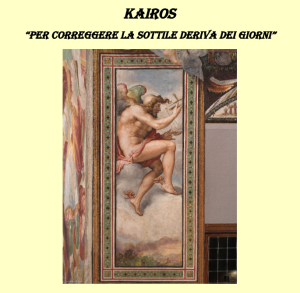
The founding idea and motif of the activity concerns contemporary society, which has been defined by Rosa the “society of acceleration”, since the speed with which the changes take place at different levels (social, economic, cultural, technological...). People are asked to reflect on the continuously evolving relationship between themselves and time, and how an accelerated time affects the ways in which individuals build their own experience. This complex intertwining between time, individuals, and society is the protagonist of the activity. Students are guided to explore time and its complex features as physical and anthropological categories. The complex relationship, which comes to life in an interdisciplinary literature-science context, is populated with meaning coming from the physics of complex systems and from the time conceptions of ancient Greeks (Chronos, Aios, Einautos, Kairos). The science of complex systems provides words and concepts such as uncertainty, unexpected, disorder, contradiction, possible scenarios, the interweaving of individual and collective, changes in spatial and temporal scale, and management of "different times", that can scaffold the thinking and help to better grapple with the “time-features” of contemporary society. Also the Greek conceptions of time shed light on these “time-features” but they also open a reflection on an anthropological perspective: as Seneca wrote - “Tempus tantum nostrum est” - namely our domain on time can be conceived as a capacity for qualitative and non-quantitative choice in relation to time. Hence the title of the project, Kairos: alongside the quantitative time of regular flow (Chronos), the eternal time (Aion), and the circular time (Einautos), there is qualitative time (Kairos) that incorporates a tension between present and future, a “hic et nunc” (here and now) that extends over time without losing the value of the present moment. Kairos embodies the educational purpose of the activity: to know and choose a good time, the ethically appropriate opportunity in a simple flow of individual and social existence together. Students are fostered to reflect and explore the physical and anthropological categories of time and their complexities by writing a collective theatre pièce. The writing is the “place” where the merging of Greek times and science of complexity is realized, with the scaffolding of narrative rules.
Kairos was born from the collaboration between the professors Sara Moresco (Italian literature teacher) and Paola Fantini (retired math and physics teacher), with the help of professor Nicola Ialeggio (in-service physics teacher), Emma Gabellini (responsible for the school chemistry laboratory), Veronica Ilari (master student involved in the FEDORA project), Francesco De Zuani (PhD student involved in the FEDORA project). The teachers chose to use curricular hours of Italian literature (about 50), since they wanted to create dynamics involving all the students and push for the activity to become structural in the next years, even if this brought huge challenges in fitting the Italian curriculum according to the activity.
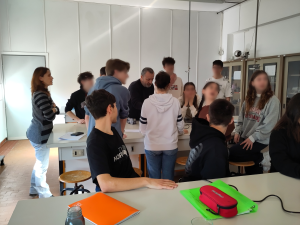
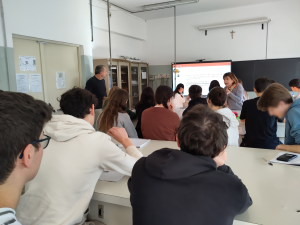
The activity consisted of 4 phases.
In the first one prof. Fantini presented in class examples of complex systems, describing their novel features compared to classical systems, and stressing the idea that society itself can be considered a complex system, so can be looked at through the “lenses” scientists use to address complex systems.
The next phase is composed of two laboratory experiences: i) one within the chemistry laboratory, where Prof. Gabellini showed a chemical oscillatory reaction; ii) one within the physics laboratory where Prof. Ialeggio helped students to reproduce the Bènard cells effect. The aim was to show temporal and spatial structures that were emerging from the microscopic interaction of system agents, a concept discussed previously in class. Some of the ideas at the basis of these two first steps come from the Educational Reconstruction made by Veronica Ilari in collaboration with Francesco De Zuani.
In the third step prof. Fantini and prof. Moresco displayed to students how to connect the physics concepts encountered with the language of writing; specifically, they chose to exploit the four kinds of “time” that ancient Greeks had (Kairòs, Aiòn, Einautòs, Chrònos) since the features which distinguish them are features which emerge in the discourse about complexity (circularity, determinism, emergence…). These features were addressed while writing by using Pirandello’s conception of comic and humorous.
Finally, the students were asked to write a theatre pièce made of 5 acts, each of which was assigned to a group of students. In the writing of the piece, students were asked to respect some constraints including dealing with the management of different temporalities. Professor Moresco is mentoring the writing process, editing the scenes, and also involving the whole class in deciding title, settings, characters, and so on.
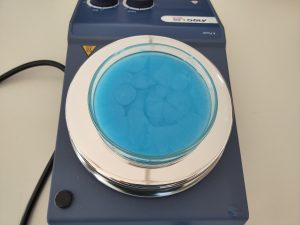 Hence, the objective of Kairos was to construct some lenses from the physics of complexity, by which being able to look at a world that is complex, to see how individuals are agents within a society that has circular causal mechanisms and emergent phenomena, develop ways, by the use of writing, to make sense of the complexity around and develop our identity as agents within that.
Hence, the objective of Kairos was to construct some lenses from the physics of complexity, by which being able to look at a world that is complex, to see how individuals are agents within a society that has circular causal mechanisms and emergent phenomena, develop ways, by the use of writing, to make sense of the complexity around and develop our identity as agents within that.
"Lenses for tomorrow", FEDORA's official podcast, is exploring our project main themes by interviewing both our project partners and some external experts. Join us to explore how to develop a future-oriented model for science education to enable creative thinking, foresight and active hope in formal and informal environments.
In the third episode, together with Elisabetta Tola and Andri Magnason we discussed the need for science education to explore new languages and art forms to nurture young people imagination in addressing contemporary socio-scientific challenges.
Enjoy it!
Despite the difficult weather conditions, last Thursday (18/05/23) the A. Einstein high school in Rimini (Italy) was able to organise the final exhibition at the end of the “AI atelier”, an interdisciplinary laboratory and extra-curricular activity designed by a group of five teachers and inspired by FEDORA’s themes and principles. The activity addressed the relationship between art, creativity, and artificial intelligence with the "same philosophy" of the Quantum Atelier project: create a space in which to experience an authentic dialogue between scientific and artistic disciplines.
The objective of the activity was to reflect on some themes that have characterised important debates since the birth of computers, such as: “Can we build intelligent machines? Can machines think?”. With the advent of neural networks and generative algorithms, also other questions become crucial: “Can artificial intelligence be creative?”, “What are the differences between humans and artificial creativity?”. During the activity, students were guided to address these questions through the reflection on the languages of contemporary art and the potential of the Open A.I. platforms like chatGPT, midjourney, and DallE. As reported by the teachers, the AI Atelier, which has, as one of the key design principles, this comparison between different creativities (the artistic one and that of AI), has become a context in which to sustain students in exploring these deep questions with the language of contemporary art. Furthermore, the Atelier was conceived as a chance to promote students’ awareness of the digital environment in which they live and to develop critical thinking on the relationship between AI and ars as well as on a possible and more sustainable relationship between humans and technology.
The collaboration between the professors Giuseppucci (Literature and Art), Gianfelici (Philosophy), Clementi, Filippi (both Math and Physics teachers), and Fantini (retired Math and Physic teacher), made this activity an interesting experiment of co-teaching, a practice not well established within the Italian school system.
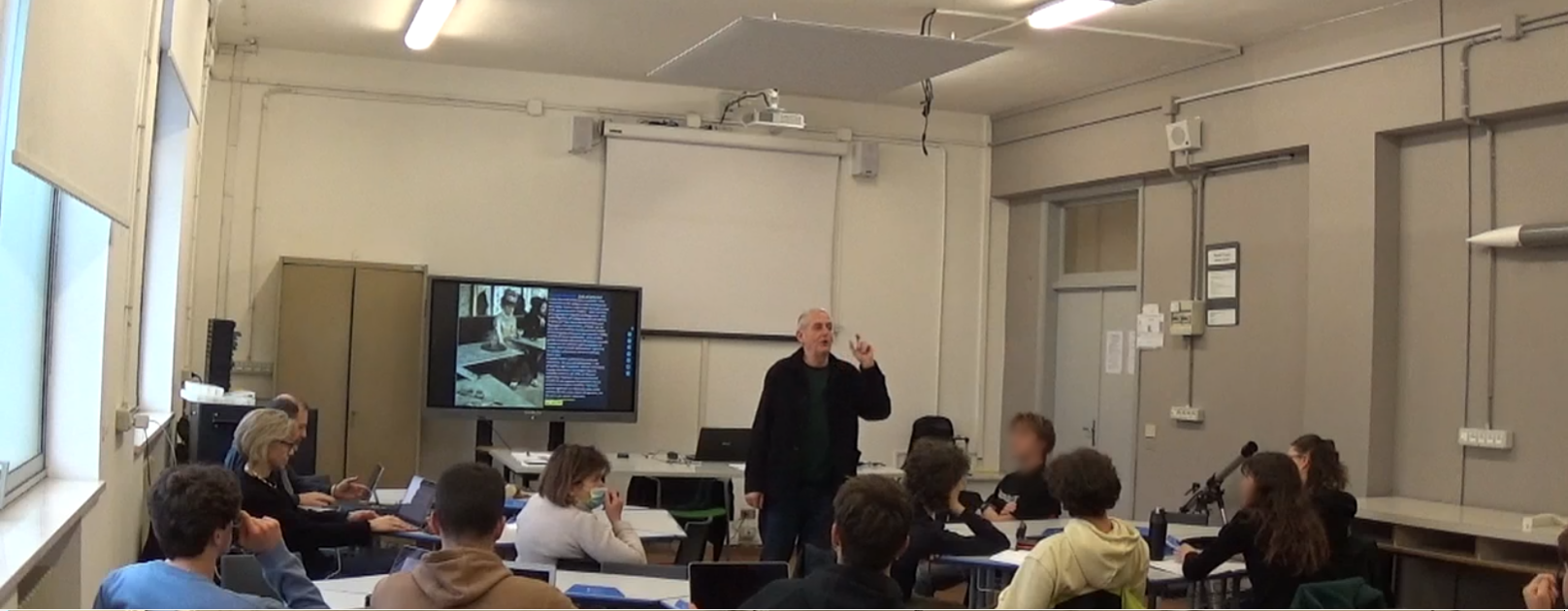
The AI atelier included three phases. In the first phase, students are introduced to the theme of creativity in human artistic thinking and in the artificial one and to some technical and critical aspects of artificial intelligence. More specifically, the first lesson, guided by Professor Giuseppucci, was dedicated to the examination of some exemplary results of human creativity in the artistic field and their comparison with some AI generated ones. In the second lesson, prof. Gianfelici presented philosophical and critical-aesthetic hypotheses highlighted over the past century regarding machine intelligence. Professors Clementi, Fantini, and Filippi intervened during those introductory moments, stimulating discussion between the participants and raising or highlighting further aspects of a scientific and technical nature in order to clarify the interpretation of AI technology. On that basis students and teachers together tried to characterise what it means, for human beings, to be creative/think creatively and confronted it with artificial processes as we know them today. The first concept raised and discussed concerned the “conditioning and consciousness of the context” that AI technologies lack in their process of creation. Discussing the relationship with the context brought to other two concepts: “limitedness”, linked to every human experience for the very fact of being at the same time “mind” and “body”; and “reality”, linked to the illusion that the impressive quantity of information, data, texts, and images, that artificial intelligences can record and manipulate, represents all the reality.
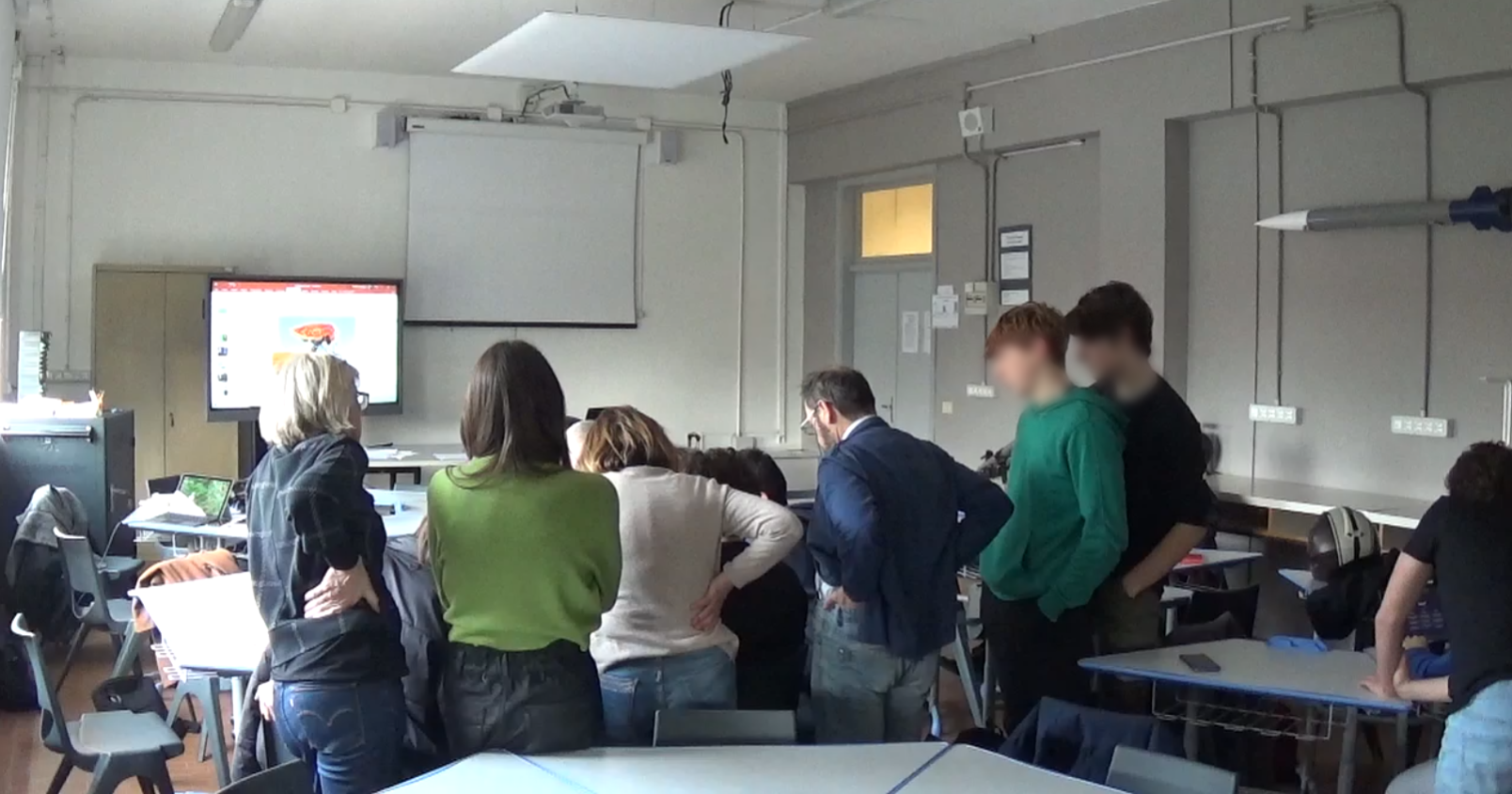
In a subsequent phase, the students were divided into groups and, assisted and advised by all professors, were invited to re-elaborate in an artistic and creative sense the concepts that had most struck them and to finally elaborate an artwork. In the last phase, in addition to considering various exhibition choices and their related communicative effectiveness, all participants were asked to draft a text about their artwork and their workshop experience.
In the following lines, there is a brief description of the artworks produced:
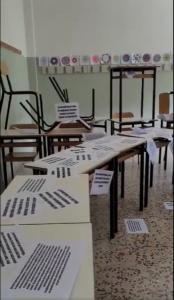
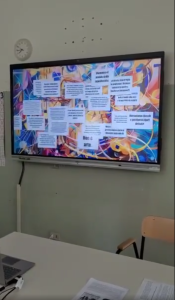
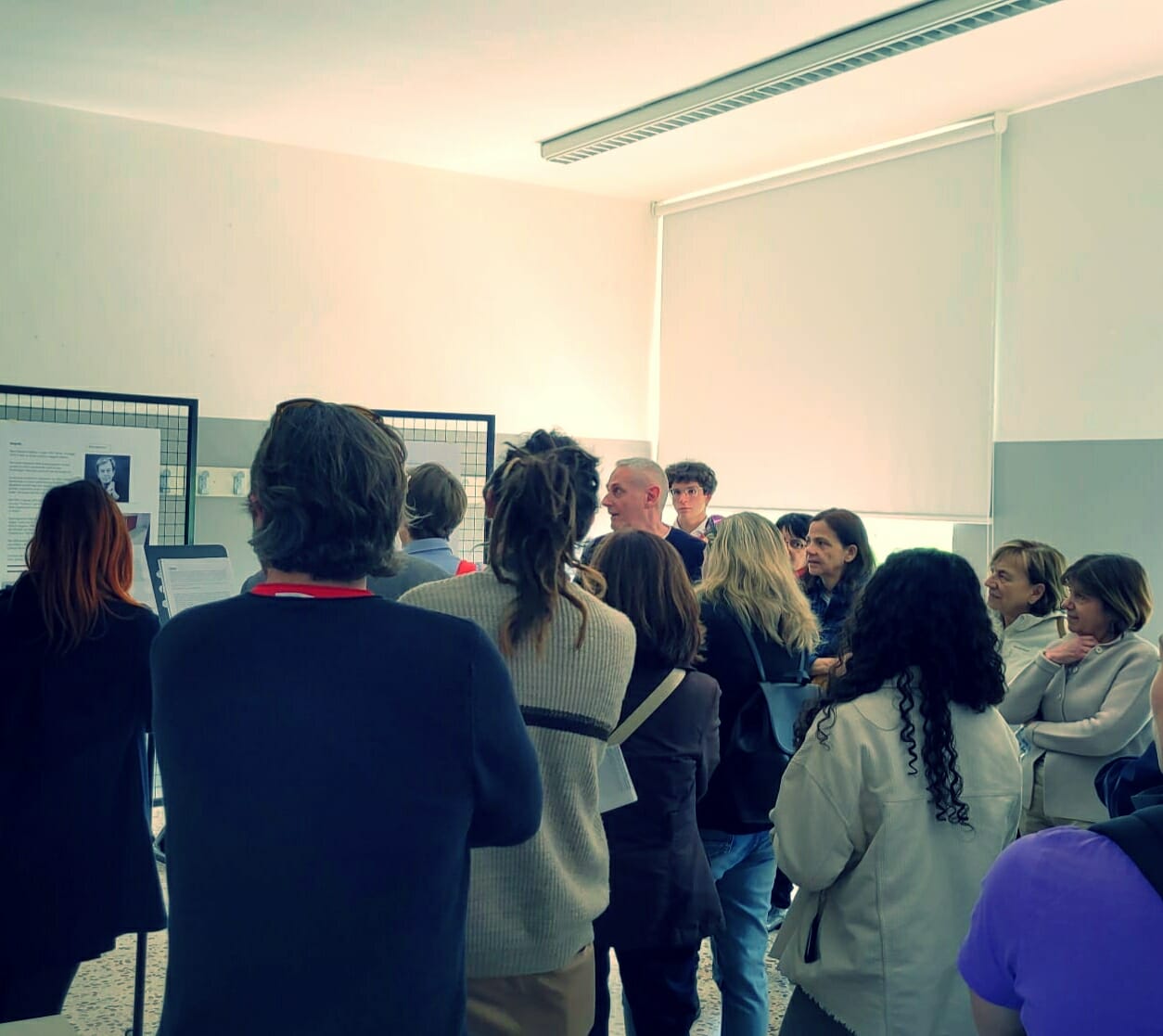
In the final exhibition, held Friday the 18th, students presented the artworks to the rest of the school, their parents, and anyone else interested.
The exhibition catalog, curated by Professor Maurizio Giuseppucci, is available at this link (the document is in Italian).
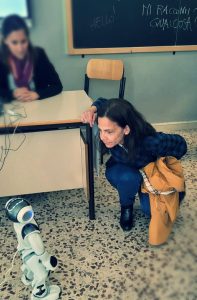
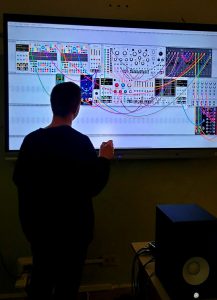
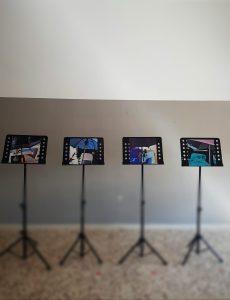
"After we talked about the many possible futures, something started happening in my mind. It's hard to say what exactly, I'm not sure what it was. A weird feeling of inspiration and motivation..."
(From the learning diary of a participant, My city of the future 2023)
As mentioned in the previous post, at the beginning of its journey FEDORA established three open schooling networks in three specific locations: Bologna, Oxford and Helsinki. Since then, researchers, teachers, communicators, and other professionals worked together at the design of activities and materials based on FEDORA's research principles and results. The activities main aim has been to help young students in developing the skills they need to navigate our modern society by engaging them in future-oriented and society-related scientific issues.
The openschooling implementation designed by the Helsinki network, My city of the future, invited upper-secondary students to envision Helsinki in the year 2050. Focusing on systemic thinking and questions of energy production and use, the students took on the challenge to produce future posters, which were used to pitch a view of a desirable and sustainable future for Helsinki city officials.
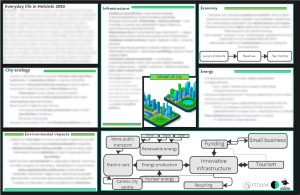
A view of one student groups' poster draft. Some sections have been translated. Note the systemic view of the city and its change.
The course started with a brainstorming session to shake off any restraints of creativity: we imagined crazy, even absurd futures for Helsinki in a workshop by Johanna Ylipulli, smart city anthropologist specialised in participatory design of urban futures. Over the course, with workshops on energy production, futures thinking and systemic views of the city, the students met with a number of experts to discuss the future possibilities and challenges of the Finnish capital.
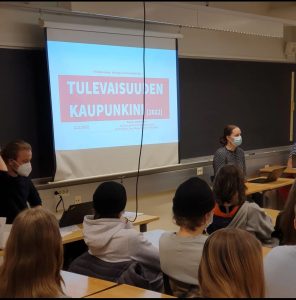
An audience of students from the school listen on as the participants outline their futures to the invited city representative (seen on the right). (Picture from the 2022 My city of the future course.)
After the course students began to conceptualise the future in a more positive, hopeful manner as compared to previous experiences. They indicated fuller consideration of the complexity of societal and environmental matters and learnt ways to understand and deal with uncertainty.
The course let students explore how to move from certain, hopeless futures with fixed mindsets towards more openness to alternatives and acceptance of the uncertainty of the future, while exploring the changes through reconsideration of agency, expertise and various drivers of change.
A "feeling" of those results can be clearly perceived in some students' quotes, like the one at the beginning of this article, and the one that follows:
"As you thing about the future, you might notice something, an issue that could be fixed (...) You can try to get to a place where you can influence that issue. And you can really decide what you want from your own future.”
(Student, post-course interview in 2022)
As part of FEDORA Project, resources for secondary teachers and students have been produced by Professor Sibel Erduran of University of Oxford, UK and Dr Olga Ioannidou of University College Dublin, Ireland. The resource pack aims to support lessons about timely and pressing issues related to science and society such as climate change. There are four sets of materials on the topic of climate change that cover the causes and effects of climate change, facts about climate change, engagement in an informal learning environment such as a museum and discussion of future scenarios. Each set is designed to engage and empower the pupils. Extension activities are highlighted about gender and career options.
The resources can be visualized/downloaded at the following link: FutuRISE
